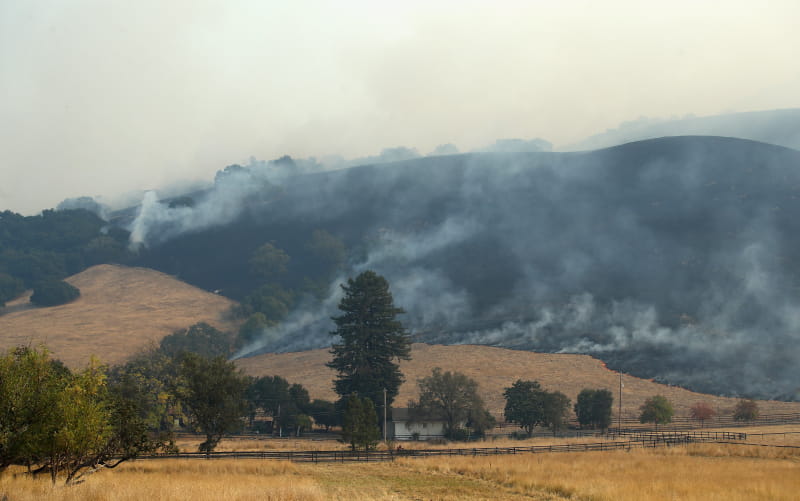Wildfire smoke threatens health of those near and far
By American Heart Association News

More than 100 wildfires are blazing through parts of the western United States, including one in California that has grown to become the largest fire in the state’s history.
Fires that vast have created logistical nightmares and health concerns for residents within their reach, as well as the firefighters working around the clock to extinguish the flames.
But the smoke hovering above states like California and Colorado has drifted far beyond state borders. The National Weather Service says the haze has traveled thousands of miles – reaching the East Coast and even parts of New England – so the impact of the smoke may soon be everyone’s concern.
While smoke exposure from wildfires has been long associated with lung problems, recent evidence suggests it also can cause heart problems, or complicate existing ones.
A study(link opens in new window) published in April found a link between the smoke from California wildfires in 2015 and an increased risk of heart attacks and strokes, and a worsening of heart failure symptoms and irregular heart rhythms, said Dr. Wayne Cascio, a co-author of the study and director of the U.S. Environmental Protection Agency’s National Health and Environmental Effects Research Laboratory in North Carolina.
The study found that emergency room visits for heart-related ailments jumped, particularly among elderly patients, on dense smoke days. The findings pointed to an increase in the amounts of fine particulate matter, or the miniscule pieces of air pollution typically produced by vehicle traffic and power plants.
Breathing these particulates increases inflammation in the blood, Cascio said.
“It affects the autonomic nervous system, which may contribute to instability in blood pressure or increase the heart rate. There’s also the possibility that particulates also affect how blood clots,” he said. “And one of the hallmarks of heart attacks and strokes is they’re associated with blood clotting.”
The “megafires” sweeping across California and other western states in recent years have created a new combination of fine particulates, said Erik Litzenberg, fire chief and city manager of Santa Fe, New Mexico.
“As these wildland fires get bigger, the contaminants aren’t just natural contaminants – or the natural byproducts of wood burning – they’re now the byproducts of homes burnings, cars burning and all of the infrastructure behind communities, like electric lines and gas,” he said.
Litzenberg noted that cardiac events already are the leading cause of death among firefighters. The problem is worsened by the fierce growth of wildfires each new year.
“Yes, smoke is an issue, but there are lots of other factors affecting cardiac health in wildland firefighters. For one, they've got inconsistent schedules with long work periods, so our sleep is poor, meaning recovery periods aren't as great,” he said. Research in older women shows sleep deprivation can increase the risk of heart disease.
Research has been limited on the actual effect of wildfire smoke on the cardiovascular health of firefighters and people living near wildfires, mainly because it’s more complicated to measure than something like the short-term effects on lung function, said Dr. Tom Hales, a medical epidemiologist for the Atlanta-based Centers for Disease Control and Prevention.
For example, among wildland firefighters, lung function can be measured before and after workers begin their shift – or at the start and end of a fire season.
“Cardiac issues are more difficult to study because the endpoint of cardiac arrest or stroke can happen months to years later" and researchers must control for risk factors such as high blood pressure, smoking and diabetes, said Hales, who has investigated on-duty deaths of firefighters due to cardiovascular disease as part of CDC’s National Institute for Occupational Safety and Health.
Cascio suggested people who live in areas near or bordering the smoke should consult the air quality index for their region, especially the particulate level, on the EPA’s monitoring website, AirNow.gov(link opens in new window). He said people sensitive to outdoor air pollution – like those with heart- or lung-related illnesses – should try to avoid smoke exposure by staying indoors with the windows shut and air conditioner on. Using a high-efficiency particulate air – or HEPA – filter also helps, he said.
For people who don’t have air conditioning and live in high-temperature areas, keeping windows closed may increase the risk of heat exhaustion or heat stroke. Cascio suggested those residents contact their local health department to ask about staying in a designated clean air shelter.
If you have questions or comments about this story, please email [email protected].




